Kia Picanto vs Mazda MX-30 – Differences & prices compared
Compare performance, boot space, consumption and price in one view.
Find out now: which car is the better choice for you – Kia Picanto or Mazda MX-30?
The Kia Picanto (Hatchback) comes with a Petrol engine and Manuel or Automatic transmission. In comparison, the Mazda MX-30 (SUV) features a Plugin Hybrid engine with Automatic transmission.
When it comes to boot capacity, the Kia Picanto offers 255 L, while the Mazda MX-30 provides 350 L – depending on how much space you need. If you’re looking for more power, decide whether the 79 HP of the Kia Picanto or the 170 HP of the Mazda MX-30 suits your needs better.
In terms of consumption, the values are 5.20 L per 100 km for the Kia Picanto, and 18.30 kWh for the Mazda MX-30.
Price-wise, the Kia Picanto starts at 14600 £, while the Mazda MX-30 is available from 30800 £. Compare all the details and find out which model fits your lifestyle best!
Kia Picanto
The Kia Picanto is a compact city car that combines practicality with a stylish design, making it an appealing option for urban drivers. Its cleverly designed interior maximises space, providing ample room for passengers and luggage despite its small footprint. With its efficient fuel consumption and easy manoeuvrability, the Picanto is well-suited for navigating through bustling city streets.
details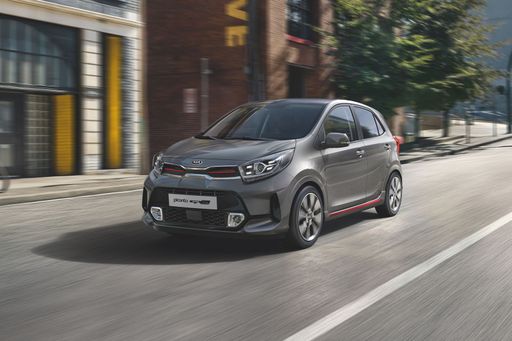 @ press.kia.com
@ press.kia.com
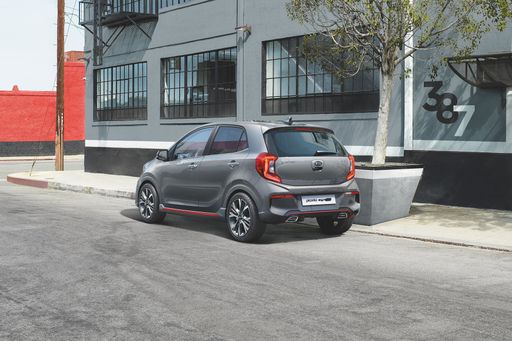 @ press.kia.com
@ press.kia.com
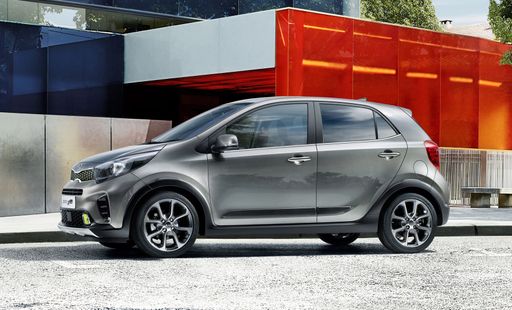 @ press.kia.com
@ press.kia.com
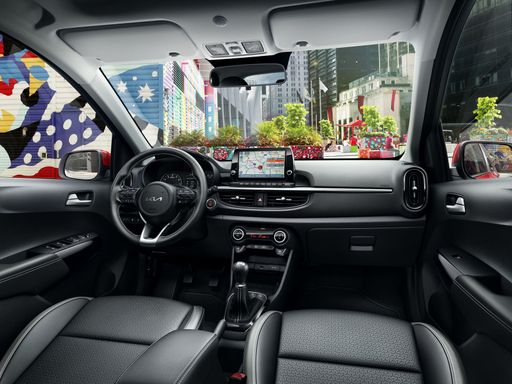 @ press.kia.com
@ press.kia.com
Mazda MX-30
The Mazda MX-30 is a compact crossover that combines unique design with an environmentally conscious approach. Its distinct exterior features a coupe-like silhouette and freestyle doors that offer practicality and style. Inside, the cabin boasts sustainable materials, creating a harmonious blend of modern aesthetics and eco-friendly innovation.
details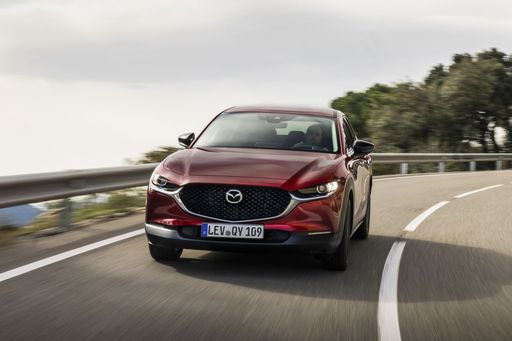 @ de.mazda-press.com
@ de.mazda-press.com
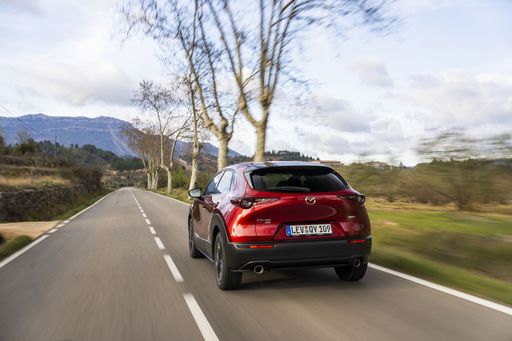 @ de.mazda-press.com
@ de.mazda-press.com
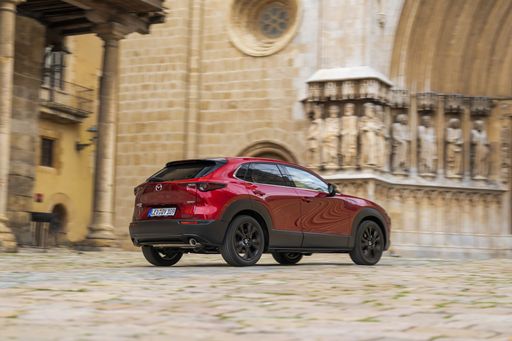 @ de.mazda-press.com
@ de.mazda-press.com
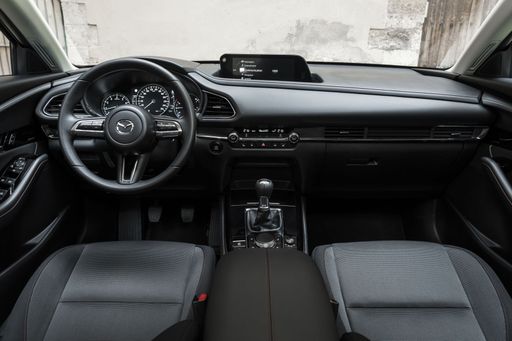 @ de.mazda-press.com
@ de.mazda-press.com

|

|
|
|
|
Costs and Consumption |
|
|---|---|
|
Price
14600 - 19300 £
|
Price
30800 - 37100 £
|
|
Consumption L/100km
5.2 - 5.7 L
|
Consumption L/100km
-
|
|
Consumption kWh/100km
-
|
Consumption kWh/100km
18.30 kWh
|
|
Electric Range
-
|
Electric Range
85 km
|
|
Battery Capacity
-
|
Battery Capacity
-
|
|
co2
118 - 130 g/km
|
co2
22 g/km
|
|
Fuel tank capacity
35 L
|
Fuel tank capacity
-
|
Dimensions and Body |
|
|---|---|
|
Body Type
Hatchback
|
Body Type
SUV
|
|
Seats
4 - 5
|
Seats
5
|
|
Doors
5
|
Doors
5
|
|
Curb weight
981 - 991 kg
|
Curb weight
1849 kg
|
|
Trunk capacity
255 L
|
Trunk capacity
332 - 350 L
|
|
Length
3605 mm
|
Length
4395 mm
|
|
Width
1595 mm
|
Width
1848 mm
|
|
Height
1485 mm
|
Height
1555 mm
|
|
Payload
339 - 425 kg
|
Payload
402 kg
|
Engine and Performance |
|
|---|---|
|
Engine Type
Petrol
|
Engine Type
Plugin Hybrid
|
|
Transmission
Manuel, Automatic
|
Transmission
Automatic
|
|
Transmission Detail
Manual Gearbox, Automated Manual
|
Transmission Detail
Reduction Gearbox
|
|
Drive Type
Front-Wheel Drive
|
Drive Type
Front-Wheel Drive
|
|
Power HP
63 - 79 HP
|
Power HP
170 HP
|
|
Acceleration 0-100km/h
13.1 - 18.2 s
|
Acceleration 0-100km/h
9.10 s
|
|
Max Speed
145 - 159 km/h
|
Max Speed
140 km/h
|
|
Torque
93 - 113 Nm
|
Torque
-
|
|
Number of Cylinders
3 - 4
|
Number of Cylinders
-
|
|
Power kW
46 - 58 kW
|
Power kW
125 kW
|
|
Engine capacity
998 - 1197 cm3
|
Engine capacity
830 cm3
|
General |
|
|---|---|
|
Model Year
2024
|
Model Year
2025
|
|
CO2 Efficiency Class
D
|
CO2 Efficiency Class
B
|
|
Brand
Kia
|
Brand
Mazda
|
Kia Picanto
Compact Versatility: An Overview of the Kia Picanto
The Kia Picanto, with its chic and compact design, is a staple in urban landscapes across the globe. Offering a deft blend of efficiency, style, and functionality, the Picanto continues to evolve, catering to the demands of the modern driver. With the 2024 model year, Kia reaffirms its commitment to providing a small car that doesn't compromise on quality or innovation.
Engine Performance and Fuel Efficiency
The Kia Picanto comes with several engine options tailored to different needs, featuring both manual and automatic transmissions. The engines range from a 1.0-litre 3-cylinder to a 1.2-litre 4-cylinder, providing a power output between 63 and 79 PS. This allows the Picanto to offer a versatile driving experience that suits both urban and suburban environments. Fuel consumption is impressively low, with figures ranging between 5.2 to 5.7 litres per 100 km, emphasising the car's eco-friendly credentials.
Innovative Design and Technology
In terms of design, the Picanto boasts sleek lines and a modern silhouette. Although it's a five-door hatchback, the car maintains its compactness with dimensions of 3605 mm in length, 1595 mm in width, and 1485 mm in height. Inside, the Picanto surprises with its clever use of space, providing a comfortable cabin for up to five passengers and a boot capacity of 255 litres.
The Picanto is equipped with advanced technology aimed at enhancing the driver's experience and safety. Available equipment lines such as Edition 7, Vision, and GT Line offer varying levels of features, including improved infotainment systems and driver assistance technologies. These innovations make the Picanto not just economical, but also a smart choice for tech-savvy car buyers.
Safety Features and Driving Comfort
Safety has always been a priority for Kia, and the Picanto is no exception. The 2024 model comes equipped with a suite of safety features designed to protect its occupants. From enhanced structural integrity to available driver assist systems, Kia ensures that driving the Picanto is both secure and enjoyable. The Picanto manages speed efficiently, with a top range between 145 to 159 km/h, and provides a torque of 95 to 115 Nm, aiding in confident handling and acceleration.
Environmental and Economic Benefits
With CO2 emissions ranging from 118 to 130 g/km, the Picanto holds a D efficiency class. This is a significant factor for environmentally conscious drivers who still want to enjoy an efficient urban vehicle. The monthly cost of ownership is between €681 and €789, with a cost per kilometre of 27.2 to 31.6 cents, positioning the Picanto as an economically wise choice for budget-conscious drivers.
The Final Verdict
Overall, the Kia Picanto remains a formidable contender in the compact car segment, thanks to its combination of practicality, innovation, and efficiency. Whether navigating the bustling city streets or heading out on a weekend road trip, the Picanto proves to be a reliable and economical partner. With its modern styling and cutting-edge technology, it stands as a testament to Kia’s ability to adapt and thrive in the ever-evolving automotive landscape.
Mazda MX-30
The Electric Revolution: Mazda MX-30
The Mazda MX-30 represents a bold leap into the realm of sustainable mobility, bringing a distinct blend of style, efficiency, and innovation. As Mazda's first all-electric vehicle, the MX-30 is designed to capture the hearts of eco-conscious drivers while delivering the fun driving experience the brand is known for. Let’s delve into what makes this vehicle stand out in the increasingly crowded electric vehicle market.
Sleek Design Meets Practicality
The MX-30 is a compact SUV that exudes a modern aesthetic with its clean lines and contemporary silhouette. Measuring 4,395 mm in length and 1,848 mm in width, the MX-30 is designed to navigate city streets with ease. Its unique freestyle doors facilitate easy access to the front and rear seats, accommodating up to five passengers comfortably.
Advanced Electric Powertrain
At the heart of the MX-30 is Mazda's e-SKYACTIV drivetrain, available in both fully electric and plug-in hybrid variants. The electric version delivers a respectable 145 PS (107 kW), whereas the plug-in hybrid offers an enhanced 170 PS (125 kW). Both versions employ front-wheel drive with a single-speed reduction gearbox, ensuring a smooth and responsive ride.
Efficiency and Range
The MX-30 showcases commendable efficiency with a power consumption ranging from 17.5 to 17.9 kWh per 100 km. Drivers can expect a maximum electric range of 200 km for the fully electric model, while the plug-in hybrid offers 85 km on electric power alone. This ensures the MX-30 is well-suited for both daily commutes and extended journeys.
Elegant Interiors and Cutting-Edge Technology
Inside, the MX-30 presents a zen-like cabin featuring sustainable materials like cork and recycled fabrics, reinforcing Mazda’s commitment to environmental consciousness. The vehicle comes equipped with a host of technological advancements, including a digital dashboard and a user-friendly infotainment system that keeps drivers connected and informed on the go.
Performance and Handling
Mazda's dedication to driving pleasure continues with the MX-30. With an acceleration time from 0-100 km/h between 9.1 to 9.7 seconds and a top speed of 140 km/h, it promises an engaging drive. The low centre of gravity, courtesy of the battery placement, and its precise steering ensure the MX-30 feels agile and responsive, whether navigating urban environments or open roads.
Safety and Features
Safety is paramount in the MX-30, which boasts an array of advanced features, including collision avoidance systems and a reinforced body structure. It also scores well on CO2-efficiency, rated between Class A and B, making it a responsible choice for eco-minded consumers.
Conclusion: Mazda MX-30 – A Vision of the Future
In conclusion, the Mazda MX-30 is a testament to the brand's innovative spirit and commitment to sustainability. With its combination of striking design, efficient powertrains, and cutting-edge technology, the MX-30 is a formidable competitor in the electric vehicle market. Offering a blend of sophistication and performance, it is poised to win over motorists who seek an environmentally friendly vehicle without compromising on driving joy.
Which drive types are available for the Kia Picanto?
Available as Front-Wheel Drive.
The prices and data displayed are estimates based on German list prices and may vary by country. This information is not legally binding.
